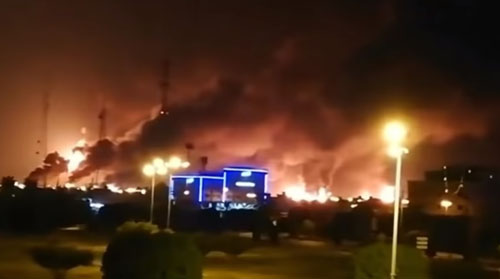by WorldTribune Staff, September 15, 2019
Iran denies it is behind the Sept. 14 attacks on Saudi Arabia’s oil infrastructure, which the United States has described as “an unprecedented attack” on global energy supplies.
Houthi rebels in Yemen, who have received financial and logistical support from Iran, claimed responsibility for the attacks on two oil-processing sites in eastern Saudi Arabia which reportedly reduced the kingdom’s daily oil output by half.

U.S. Secretary of State Mike Pompeo put the onus squarely on Iran, saying “There is no evidence the attacks came from Yemen.”
The Saudis have stopped short of acknowledging the Houthis were behind the attacks. Riyadh is also likely to blame the attacks on Iran, which has lately vowed that it would shut down the Strait of Hormuz to tanker traffic if it is prevented from exporting its oil.
According to some reports, the attacks were launched from Iraq where Iran-backed forces are strategically positioned.
The Iraqi government on Sept. 15 issued a statement rejecting reports “about its land being used to attack Saudi oil facilities.”
“Iran has now launched an unprecedented attack on the world’s energy supply,” Pompeo said. “We call on all nations to publicly and unequivocally condemn Iran’s attacks.”
The attacks reduced production by 5.7 million barrels a day, according Saudi Aramco said. That affects 5 percent of the world’s daily oil production, Reuters and The Wall Street Journal reported.
Iranian Foreign Ministry spokesman Abbas Musavi denied the Islamic Republic was involved, saying in a statement that “such fruitless and blind accusations are incomprehensible and meaningless.”
The accusations, he said, were intended to justify “future actions” against Iran.
Condemnations of Iran following the attack led a senior Iranian Islamic Revolutionary Guard Corps (IRGC) commander to warn that his county was ready for war.
“Everybody should know that all American bases and their aircraft carriers in a distance of up to 2,000 kilometers around Iran are within the range of our missiles,” the semiofficial Tasnim news agency quoted commander Amirali Hajizadeh as saying.
According to the Houthis’ AL-Masirah news agency, the Iran-backed rebels deployed 10 drones to target state-owned Saudi Aramco oil facilities in Abqaiq and Khurais.
Houthi drones are based on Iranian models which are often developed from North Korean technology.
The Saudi Interior Ministry confirmed that the attacks caused fires at the two facilities. In a statement posted on Twitter, the ministry said the fires were under control and that authorities were investigating.
White House counselor Kellyanne Conway said on “Fox News Sunday” that the United States could move to stabilize the the global energy supply by tapping its emergency petroleum reserve.
“Secretary Pompeo has made clear that the Iranian regime is responsible for this attack on civilian areas and infrastructure vital to our global energy supply, and we are not going to stand for that,” Conway said. “Our Department of Energy stands ready to tap into the Strategic Reserve, petroleum reserve if we must to stabilize the global energy supply.”
The U.S. Strategic Petroleum Reserve is authorized to store 713.5 million barrels of oil in underground salt caverns in Louisiana and Texas. The president may authorize crude oil withdrawals in cases of emergency.
Intelligence Brief __________ Replace The Media
